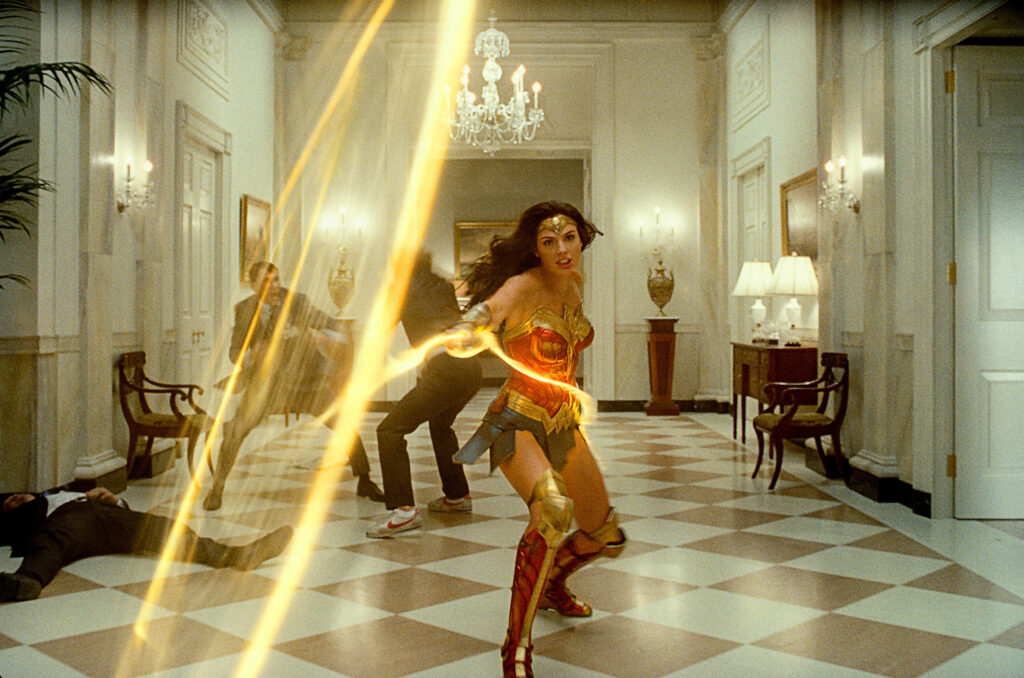
After three years and numerous COVID-related delays, the long awaited sequel to the 2017 landmark hit film Wonder Woman has finally arrived. Due to circumstances beyond the filmmakers’ control, this film is being seen as a sort of canary in the coal mine for the future of cinema itself. Despite all the added extra pressure, does the film achieve the bare minimum in being a suitable follow-up to its classic predecessor?
Wonder Woman 1984 transports us to heroine Diana Prince (Gal Gadot) in the vibrant and sleek 1980s. While she has clandestinely come into her full powers as an Amazonian demigod, she maintains a low profile by curating ancient artifacts for the Smithsonian and only performing heroic acts incognito. Diana continues to mourn the loss of her beau Steve Trevor (Chris Pine) almost 70 years earlier, cutting herself off from connecting with anyone else. But soon, Diana will have to muster all of her strength, wisdom and courage after she and coworker Barbara Minerva (Kristen Wiig) encounter aspiring oil tycoon and conman Maxwell Lord (Pedro Pascal) as he attempts to find a mysterious artifact of the Gods that has the power to grant wishes…at a price. Diana will be forced to choose between a comforting lie or the ugly truth in order to save the world.
To say that Wonder Woman 1984 starts slowly is a bit of an understatement. Due to a script that can be unclear at times in terms of the nature of the film’s MacGuffin and the conflict it is generating, the first two acts consist of watching characters with muddled motivations in scenes that feel random and uninteresting. Things pick up slightly in the second act once Gadot and Pine are reunited as Prince and Trevor in the love affair that charmed so many audiences in Wonder Woman. The two actors display the same chemistry, romance, and comedic back-and-forth that made them so beloved and prevent the film from sinking completely. Kristen Wiig shows good potential in the role of the misguided antagonist Barbara and has her moments in the film, but isn’t given enough screen time to make a larger impression; there’s a good performance in there somewhere, she’s just not given enough to showcase it. Such is the case for this film that features some very good elements like the aforementioned chemistry between its romantic characters, a score from Hans Zimmer that recalls the high points of Richard Donner’s Superman: The Movie, and cinematography that is eye-popping at moments. The overall earnestness that recalls Donner’s groundbreaking 1978 film feels dated in 2020, particularly when paired with a story that feels light on complexity and substance.
This review avoids being a completely negative read on the film due to a third act where the plot develops a little more and we learn more about what the film is attempting to say and the motivations of its characters. It culminates in an extremely well executed third act that is perfectly paired down and a departure from the overdone explosive CGI fights that have come to define the comic book movie genre and into the battle of ideological wills between villain and hero that previously separated fare like The Dark Knight and X-Men: Days of Future Past from their peers. Director Patty Jenkins’ decision to follow through on its exploration of the themes of truth, lies, ambition, and power and skip the big knockdown drag out final fight frankly saves the film and elevates it slightly above another ho-hum superhero affair.
Wonder Woman 1984 tackles themes that are at once timeless in the their examination of human nature, but also particularly resonant and topical for the world which we currently inhabit. As a result of the monkey’s paw nature of the ancient artifact that eventually consumes Maxwell Lord, each of the film’s main characters are forced to wrestle with achieving their wildest aspirations and having those dreams come true versus the ensuing consequences and having to weigh the greed and selfishness of holding onto them knowing the costs. Barbara, Maxwell, and Diana each pays a cost in order to have their wish come true and each at points appears willing to put up with it no matter who suffers as a result. The choice they face weighing personal gain versus collateral damage serves as commentary on our own pursuits of happiness and the lengths to which we’re willing to go in order to reach them. Current happenings in our world have highlighted the extent to which self-centeredness and selfishness reign supreme amongst the populace and the ideological conflict at the center of the film explores this perfectly and in an interesting way. Similarly, the characterization of Maxwell Lord and his descent into megalomania as his wish comes to fruition also serves as commentary on our world and the lust for power of many of our rich and powerful citizens that often leaves the rest of the world contending with the negative resulting fallout.
Wonder Woman 1984 had a heavy lift following up a film that entertained so many and meant so much to audiences simultaneously; following up beloved classics can be tough. Unfortunately, it just isn’t up to the job and can be a tedious watch that only avoids being a total disappointment due to Gal Gadot and Chris Pine’s everlasting chemistry saving a poor opening script and a third act that offers a refreshing instance of grounded conclusion in a genre that sorely needs it. While these positive aspects along with a majestic score and quality cinematography elevate the film somewhat, the flimsy story and lack of material for Kristen Wiig and even Gadot at times is too much to overcome.
Image: Warner Bros.

